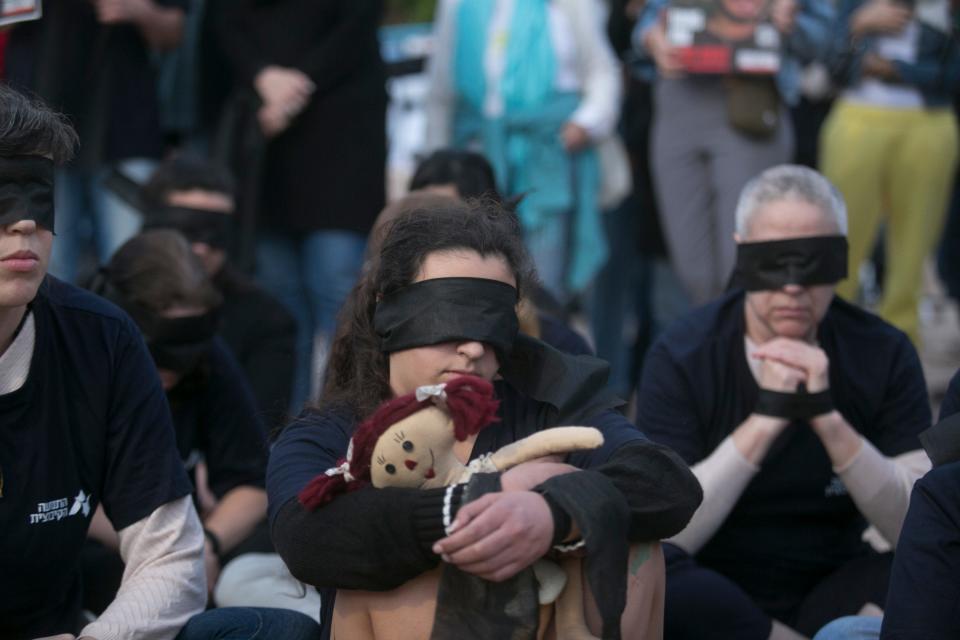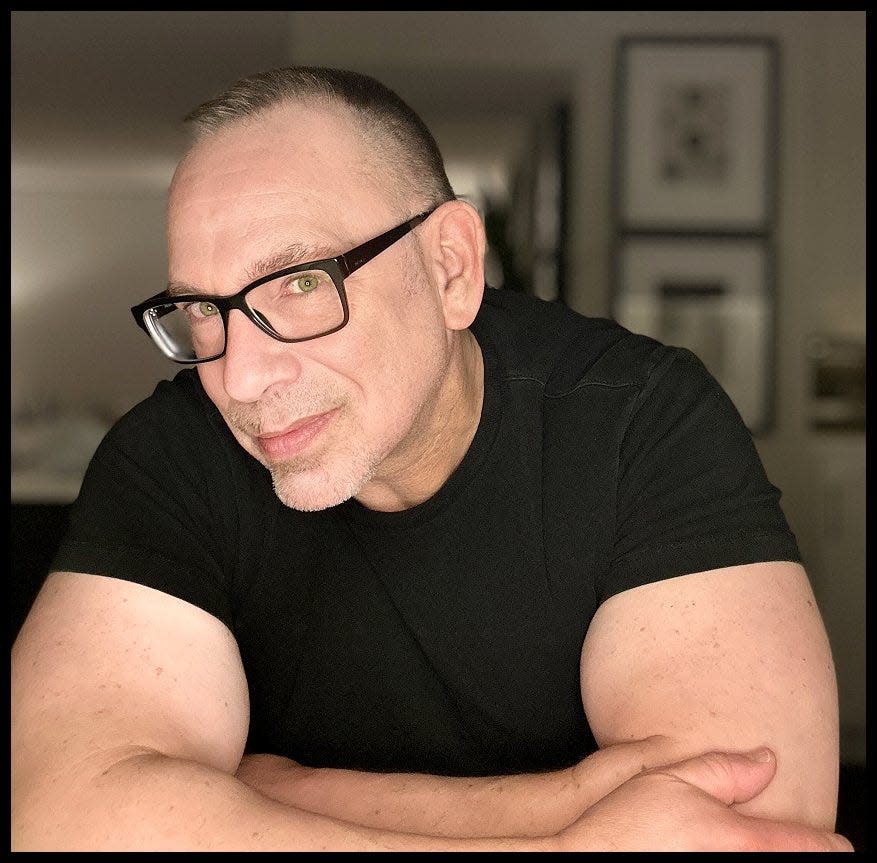I'm an atheist, but Israel-Hamas war has pulled me closer to my Jewish roots
My partner of 13 years was diagnosed with cancer recently. This week, a team of surgeons will remove half of his large intestine, and hopefully all the malignant tumor. On Thanksgiving, when we got the word that the cancer was operable and he had a good prospect for survival, I confided to a Jewish friend that I had been terrified the cancer had spread and that the man I love would spend his last months in agony. Without missing a beat, my friend replied: “Of course you did, you’re Jewish.”
We both laughed, because I immediately knew what he meant: Jews expect tragedy. That I intuitively understood this surprised me, because I’m an unlikely candidate to understand the subtext of anything related to Judaism. In short, I’m a bad Jew.
My parents are not religious, and I have always been a nonbeliever. At 13, when Jewish boys become young men, they participate in a bar mitzvah ceremony in which they read from the Torah, the Jewish equivalent of the Bible. Instead, I gave a speech about Albert Einstein at my humanistic Judaism temple run by a gay rabbi who preached to a congregation of atheists.
Given my aversion to all things religious, why is it that I have always felt a strong connection to the Jewish community?
There is a shared trauma among a people who had 6 million others in their tribe murdered because of who they are. I don’t have to believe in God or refuse to eat bacon to understand that a large part of the world thought people like me should be exterminated and committed 6 million murders toward that genocidal goal.
Julianna Margulies: My non-Jewish friends, your silence on antisemitism is loud
Antisemitism is an ever-present danger to all Jews
It's true that I was not alive during World War II, when members of my family were being kidnapped from their homes in Germany and Hungary, packed into trains like cattle, and gassed to death in concentration camps that littered Europe like waste-disposal outposts.
But unlike the 1918 flu pandemic or a host of other deadly diseases that were extinct before I was born, antisemitism – and violence in its name – is an ever-present danger to all Jews.
It is not just thousands of miles away in Viktor Orban’s neo-Nazi Hungary and other European nations. Since Donald Trump captured the White House in 2016, and gave his supporters the green light to ignore polite society’s demand that expressions of blatant religious, racial and LGBTQ+ hatred be limited to discussions between likeminded bigots, there has been an explosion of hatred directed at minorities, including Jews.
I investigated white supremacists. The rising hate in America now is alarming.
Remember Trump referring to a 2017 mob in Charlottesville, Virginia – wearing Nazi paraphernalia and shouting “Jews will not replace us!” – as “very fine people”? And who could forget the mass murder in Pittsburgh at a Jewish synagogue that followed a year later?
Expressions of antisemitism have gotten exponentially worse since the Palestinian terrorist organization Hamas carried out a bloody attack on Israeli civilians on Oct. 7 – slaughtering 1,200 Israelis and taking 240 hostages:
In Russia, a mob rampaged through an airport searching for passengers arriving from Israel to attack.
A Berlin synagogue was firebombed.
A man stabbed a Jewish woman twice in the stomach at her home in France.
And in the United States, antisemitic incidents rose almost 400% just in October, according to the Anti-Defamation League.
It's not just the MAGA fringe and myopic progressive left who are stoking the fires of antisemitism. It’s the richest man in the world, with one of the biggest social media platforms. Elon Musk megaphoned to his 166 million X followers that Jewish communities push “hatred against whites.”
Opinion alerts: Get columns from your favorite columnists + expert analysis on top issues, delivered straight to your device through the USA TODAY app. Don't have the app? Download it for free from your app store.
Jews are being cast as a proxy for the government of Israel
From my grade school days, when my brother and I were the only Jewish kids in our military base school in Shreveport, Louisiana, I have experienced antisemitism. But I can never remember a time when I felt more threatened by it than now.
I empathize with the suffering and death of civilians in Gaza. How could anyone not?
But it is wrong to ignore context and these facts: Hamas brutally attacked Israeli civilians; Hamas is committed to destroying Israel and one of its leaders said the Oct. 7 slaughter was just a “rehearsal”; Hamas uses civilians as shields, so that targeting Hamas necessarily means there will be civilian casualties; and Hamas has Israeli hostages it refuses to release.
Hamas terrorists took my family hostage. We're still pleading with the world for help.
Is it any wonder that Israel is committed to ending the existential threat of Hamas?
Reasonable minds may differ on exactly how much force is necessary for Israel to protect itself, but the voices that argue against Israel using military force to defend itself and its people are anything but reasonable.

And calls from the progressive left for a cease-fire because there have been more Palestinian casualties than Israeli casualties is a bizarre false equivalency that would argue that the penalty for robbing a bank of $500 should be a $500 fine. Israel’s response to the Hamas attack is designed to prevent future attacks, not create a tit for tat that would promote a never-ending state of danger with a terrorist organization whose goal is to finish what Adolf Hitler started.
But what is most disturbing about this global pile-on is not the disagreement with Israel’s response to Hamas’ act of war; it is the vicious attack of the Jewish people. There is little effort to distinguish between the political action of the Israeli government and Jews across the globe, despite endless pronouncements drawing a bright line between civilian Palestinians and the Hamas government they elected.
When you strip back the tortured intellectual justifications, there is a reason the Jewish community is being cast as a proxy for the government of Israel: It’s not just that people do not like Israel’s response to being attacked; it’s that they don’t like Jews. We understand this. Jews feel it to our core.
As Israel continues to fight a war that was started by Hamas, Jews around the world will continue to recoil at the global outpouring of antisemitism that we tried to convince ourselves would never happen again, but that we always feared would.

Michael J. Stern was a federal prosecutor for 25 years in Detroit and Los Angeles. Follow him on Threads: @MichaelJStern1
You can read diverse opinions from our Board of Contributors and other writers on the Opinion front page, on Twitter @usatodayopinion and in our daily Opinion newsletter.
This article originally appeared on USA TODAY: Hamas war, antisemitism have pulled me closer to my Jewish roots

